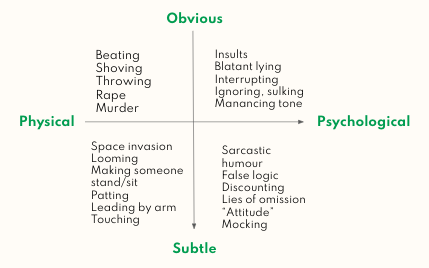The Abuse of Power
We don't talk much about "abuse" at work. But if we define abuse as the negative use of power, perhaps we should.
Author
Philippa Richardson
Pip is a Transactional Analysis psychotherapist and creates our service. Through her training and life experience - 3 families, 3 continents, 3 careers (law, marketing, psychology) - Pip has come to see how we all write our own life story.

Power is all around us – we experience its use and abuse every day from the earliest days of our lives.
After spending our youngest years subject to the daily impact of other people’s power, we quite naturally take oppressive or submissive roles as adults. The acceptance of power imbalances and abuses is drilled into us through our life-long immersion in hierarchy and competition – both in our families and in the wider world.
Power Abuse
Imagine that you're sitting on a park bench in a sunny spot that I want to occupy. If I can take the place away from you, I will have manifested my power.
If I'm sufficiently strong, I can push you or lift you out of your spot. This is an example of crude physical power.
If I can get you out of your seat without using physical force I am using my psychological power. This depends on my capacity to ignite your energy to cause you to do what you don’t want to do.
All psychological power plays depend on obedience. I can intimidate or persuade you out of the seat. I can cause you to feel guilty and give up your seat to me. I can bully or threaten you, or use the sheer volume of my voice. I can trick you or lie to you. I can entice you with a smile, or with a promise, or I can convince you that giving up your seat to me is necessary for national security.
Whatever my method, if I overcome your resistance to giving up your seat without using physical force, I have used my psychological power, which relies on obedience on your part probably through the creation of fear.
The Forms of Abuse
All abuse is some kind of mis-use of personal power.
An abuse of power takes two main forms : physical and psychological.
Abuse can be expressed in both subtle ways and in obvious ways.
Psychological
A climate of words, tone and behaviours that undermine, damage or demean.
Physical
Any form of physical contact that is unwanted, rejected or forced.
Sexual
Any form of sexual activity that is unwanted, rejected or forced.
Identifying Abuse
We can identify all abuses of power in four simple ways:
Physical or psychological; and
Subtle or obvious.

Ordinarily people, even in violent environments, do not experience direct physical or sexual power abuse. When they do, they usually know about it. It is never ok.
Most of the oppression or abuse that people experience is psychological. This can be emotional, verbal, or financial and it is repetitive.
We must all be alive to how we use and experience the use of personal power. Whether in personal or professional relationships, and whatever the context.
Written with thanks and acknowledgment to Claude Steiner: quoted from The Heart of the Matter, 2009